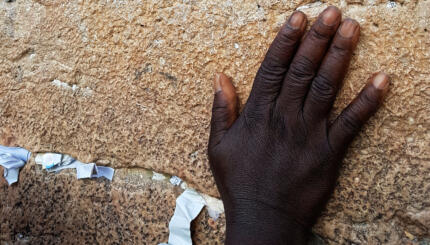The following article discusses the development of the short blessing that fathers traditionally recited when their sons reached the age of bar mitzvah. The blessing is recited today in traditionalist and some liberal synagogues, though many other liberal communities have eliminated it. In those communities that have retained it and in which girls have equivalent ceremonies to boys, parents recite the blessing for their daughters as well. Reprinted with permission from Life Cycles in Jewish and Christian Worship (The University of Notre Dame Press).
While the term “bar mitzvah” occurs in the Talmud to describe one who is subject to the commandments, early rabbinic literature provides no reference to an occasion or rite under that name. However, there is some suggestion that the 13th birthday did not pass unnoticed, for it was marked by a blessing.
 “Rabbi Phinehas said in Rabbi Levi’s name: They [Jacob and Esau] were like a myrtle and a wild rose-bush growing side by side; when they reached the age of maturity, one displayed its fragrance, and the other grew its thorns. So for 13 years both went to school. But after turning 13, one went to the study hall and the other to idolatrous shrines. Rabbi Eleazar ben Rabbi Simeon said: A man is responsible for his son until the age of 13: thereafter he must say, ‘Blessed is He who has now freed me from the responsibility of this boy'” (Genesis Rabbah 63:10).
“Rabbi Phinehas said in Rabbi Levi’s name: They [Jacob and Esau] were like a myrtle and a wild rose-bush growing side by side; when they reached the age of maturity, one displayed its fragrance, and the other grew its thorns. So for 13 years both went to school. But after turning 13, one went to the study hall and the other to idolatrous shrines. Rabbi Eleazar ben Rabbi Simeon said: A man is responsible for his son until the age of 13: thereafter he must say, ‘Blessed is He who has now freed me from the responsibility of this boy'” (Genesis Rabbah 63:10).
We have therefore an early and distinct reference, in a midrash collection usually dated no later than the fifth century, to a blessing that was associated with a boy’s coming of age. However there is no evidence that actual recitation of this blessing ever occurred, at least not in any public forum whence it would have received some form of official recognition in legal literature that customarily records such things as obligatory. No further reference to this blessing can be found until the 14th century when Aaron ben Jacob Hakohen of Provence wrote:
“It is written in Genesis Rabbah…that he whose son reaches the age of 13 must say the blessing, ‘Blessed is He who has now freed me from the responsibility of this boy.’ There are those who say it the first time that the boy receives his aliyah to read the Torah. The [eighth-century] Gaon Rabbi Yehudai rose in the synagogue and said this blessing the first time that his son read the Torah.”
This 14th-century source provides us with our first reference to a public occasion marking a boy’s reaching the age of majority, claiming, however (whether accurately or not), that the precedent extends back some six centuries.
By the 17th century, the Polish commentator and jurist Abraham Gumbiner (1635- 1683), tells us,
“Nowadays it is customary to say the blessing at the point at which the youth prays or reads on the first Sabbath [after his 13th birthday] such that it will be publicly known that he is a bar mitzvah. In such a case, the father says, “Blessed is He who has now freed me from the responsibility of this boy.”
The customary understanding of this blessing, according to Gumbiner, is that “up until now, the father has been punished when the son sinned because he had not educated him [as it is assumed that it is the father’s responsibility to teach the child].”
Because this blessing is mentioned not in the Talmud, but only in the midrashic literature, which is held to be of secondary legal importance, there is some discussion about whether or not it has legal standing. Hence the question is asked whether or not the full blessing formula that includes the name of God (Barukh atah adonai, eloheinu melekh ha ‘olam) should be used, or whether an abbreviated version of the formula without this formal address should suffice.
The first reference to this question appears in Moses Isserles’ comment (16th-century Poland), “It is good to say [the blessing] without the [formula containing God’s] name and sovereignty.…” The question regarding its legality may actually have arisen because of a larger ambivalence. Originally just an age-of-majority status, bar mitzvah had become a ritual ceremony, which in Isserles’ time was likely a recent innovation. Since people were now saying the blessing in a public ritual setting, authorities worried about its propriety.
Generally today the form of this blessing is established by local practice, some saying it in its longer form and some preferring the truncated version. In either case–in the 14th-century claim about an eighth-century practice, as well as today–it is said when the son reads from scripture, at precisely that point when he enters (tangibly) into the cult of Torah.
aliyah
Pronounced: a-LEE-yuh for synagogue use, ah-lee-YAH for immigration to Israel, Origin: Hebrew, literally, “to go up.” This can mean the honor of saying a blessing before and after the Torah reading during a worship service, or immigrating to Israel.
bar mitzvah
Pronounced: bar MITZ-vuh, also bar meetz-VAH, Origin: Hebrew, Jewish rite of passage for a 13-year-old boy.
mitzvah
Pronounced: MITZ-vuh or meetz-VAH, Origin: Hebrew, commandment, also used to mean good deed.
Talmud
Pronounced: TALL-mud, Origin: Hebrew, the set of teachings and commentaries on the Torah that form the basis for Jewish law. Comprised of the Mishnah and the Gemara, it contains the opinions of thousands of rabbis from different periods in Jewish history.


